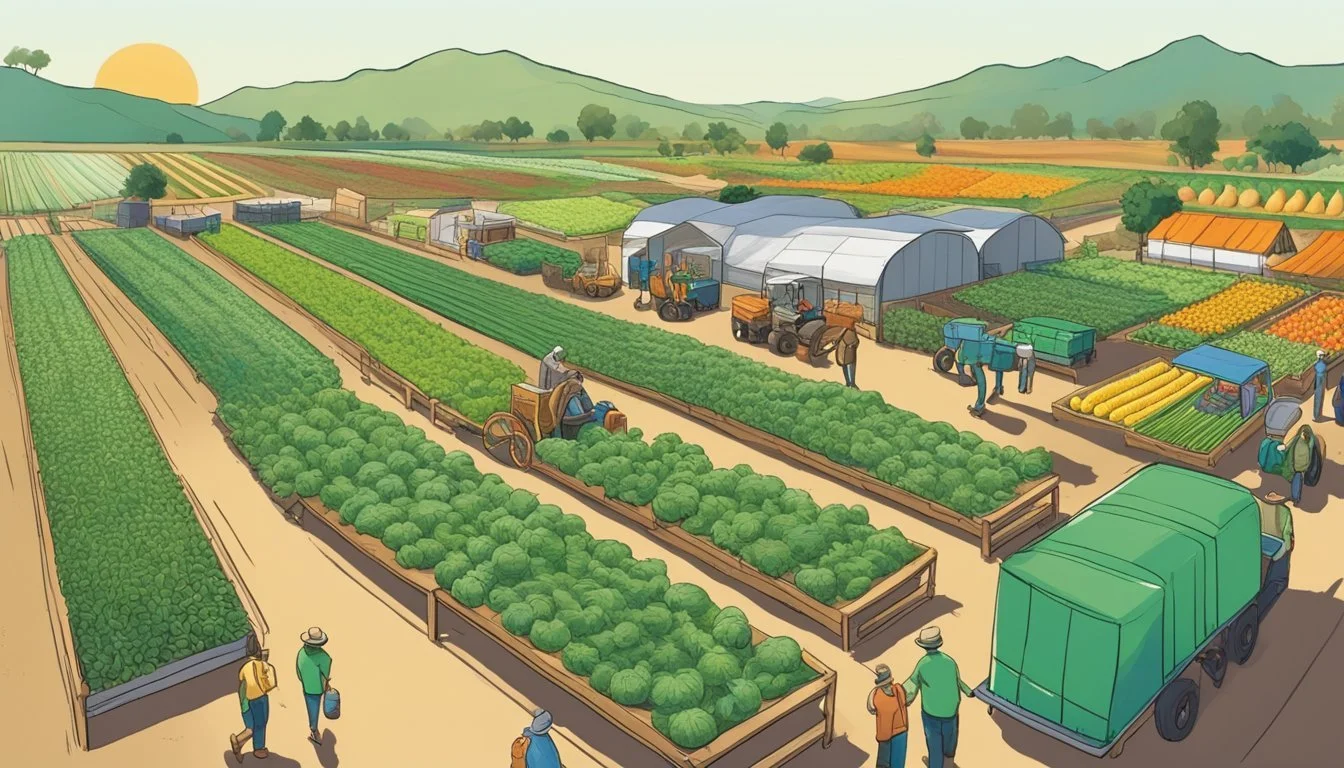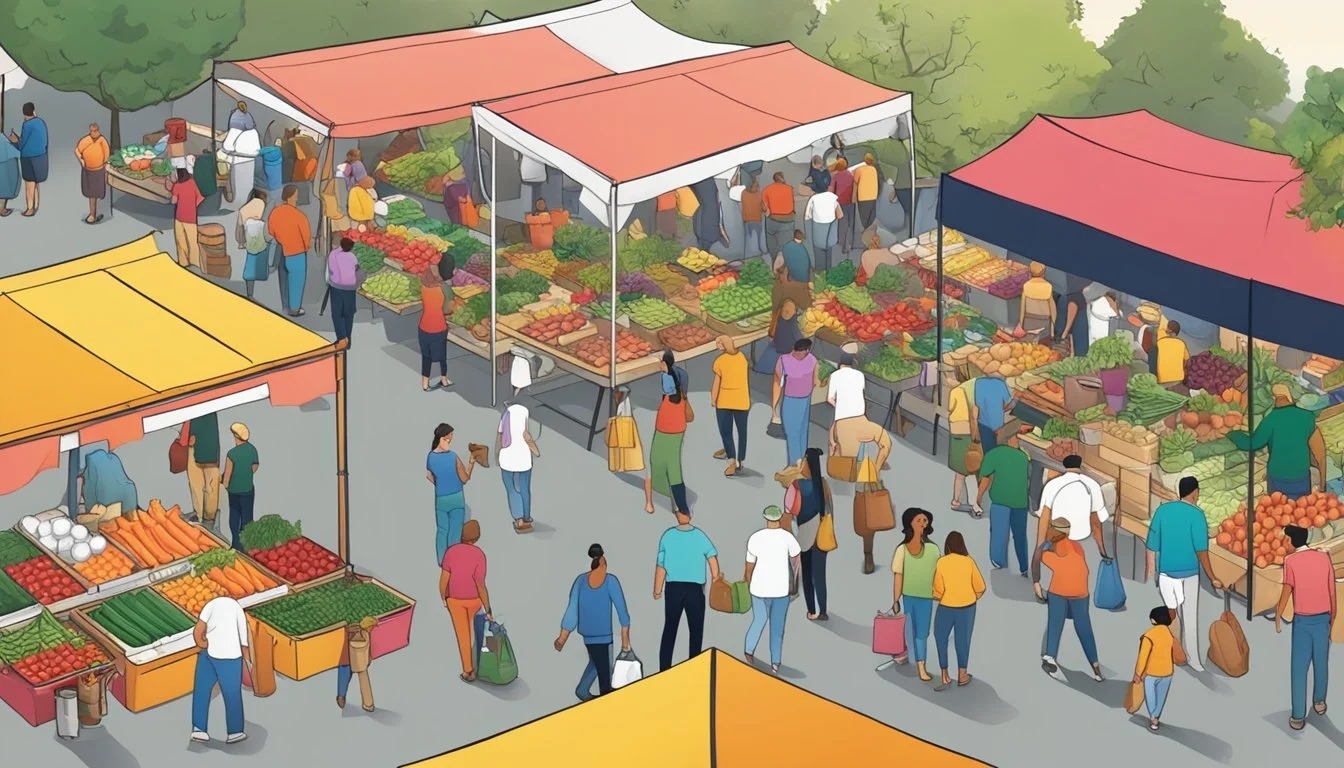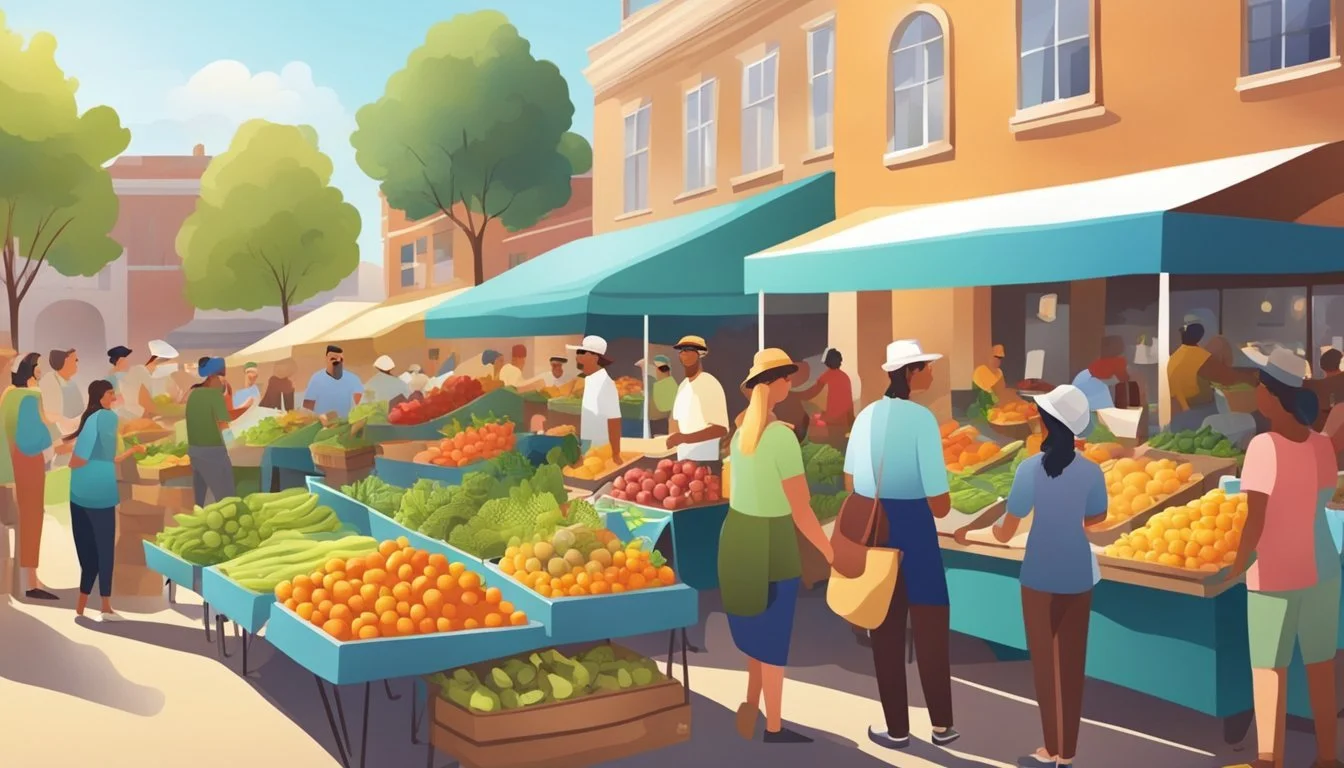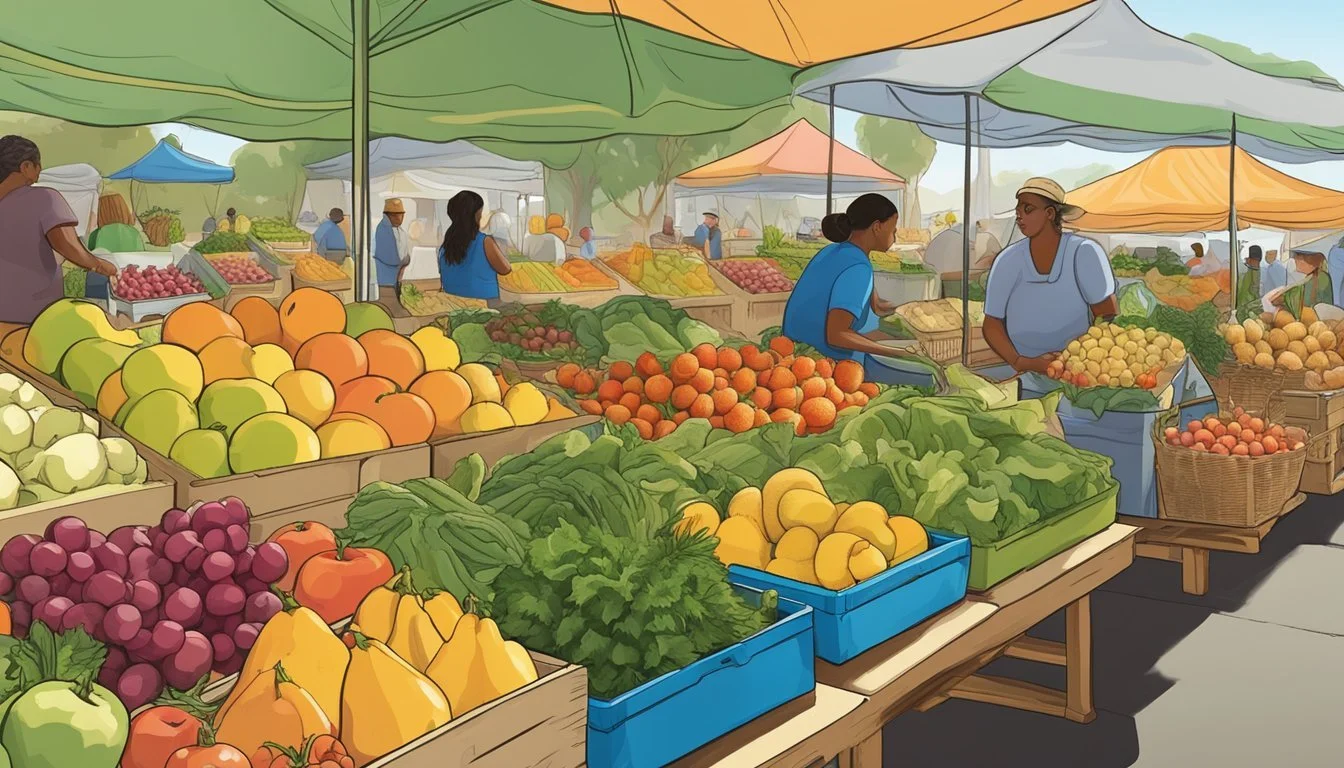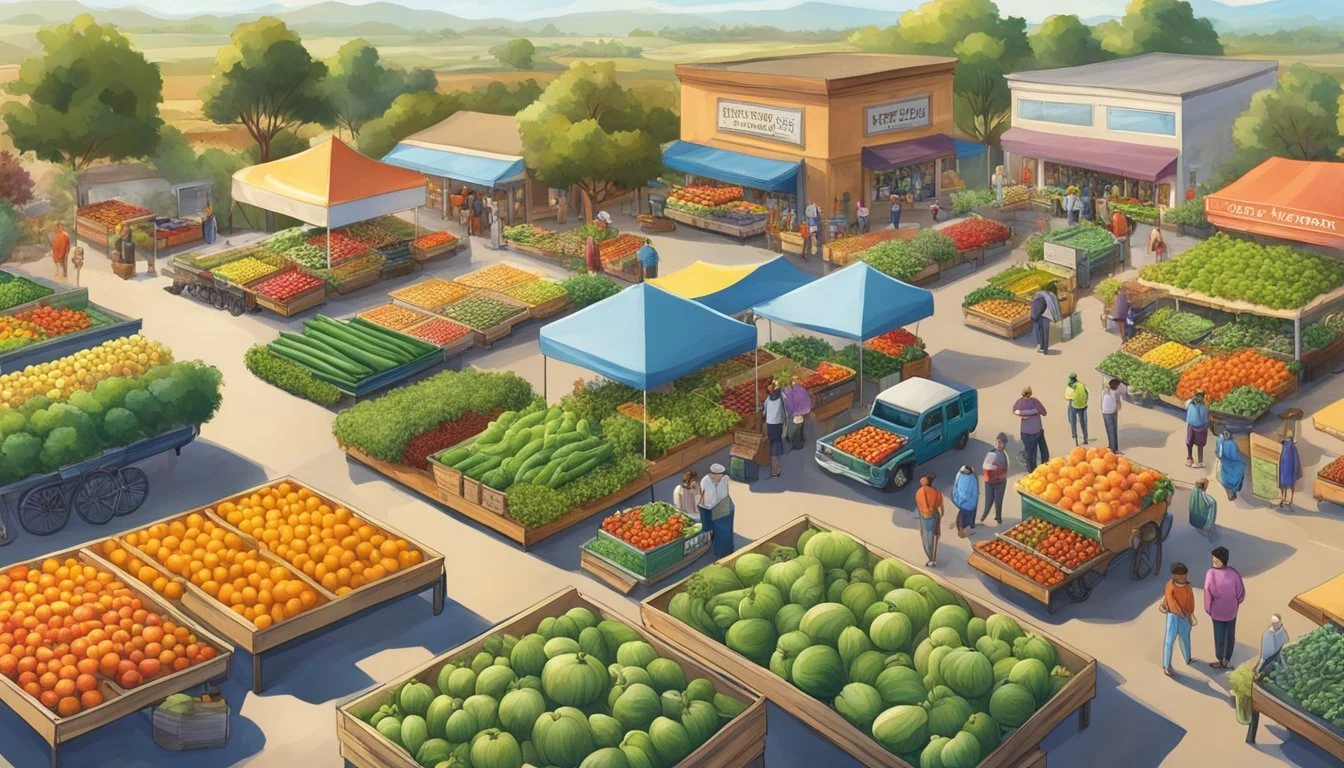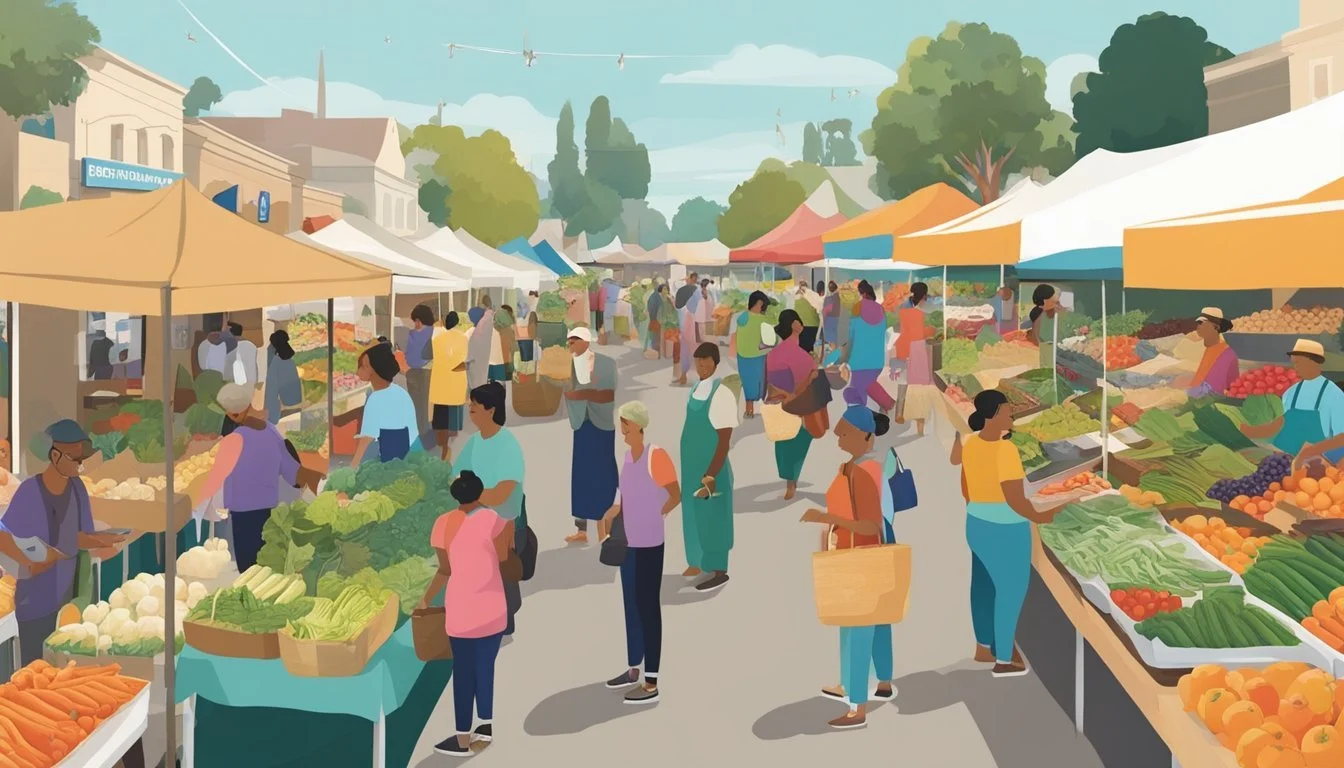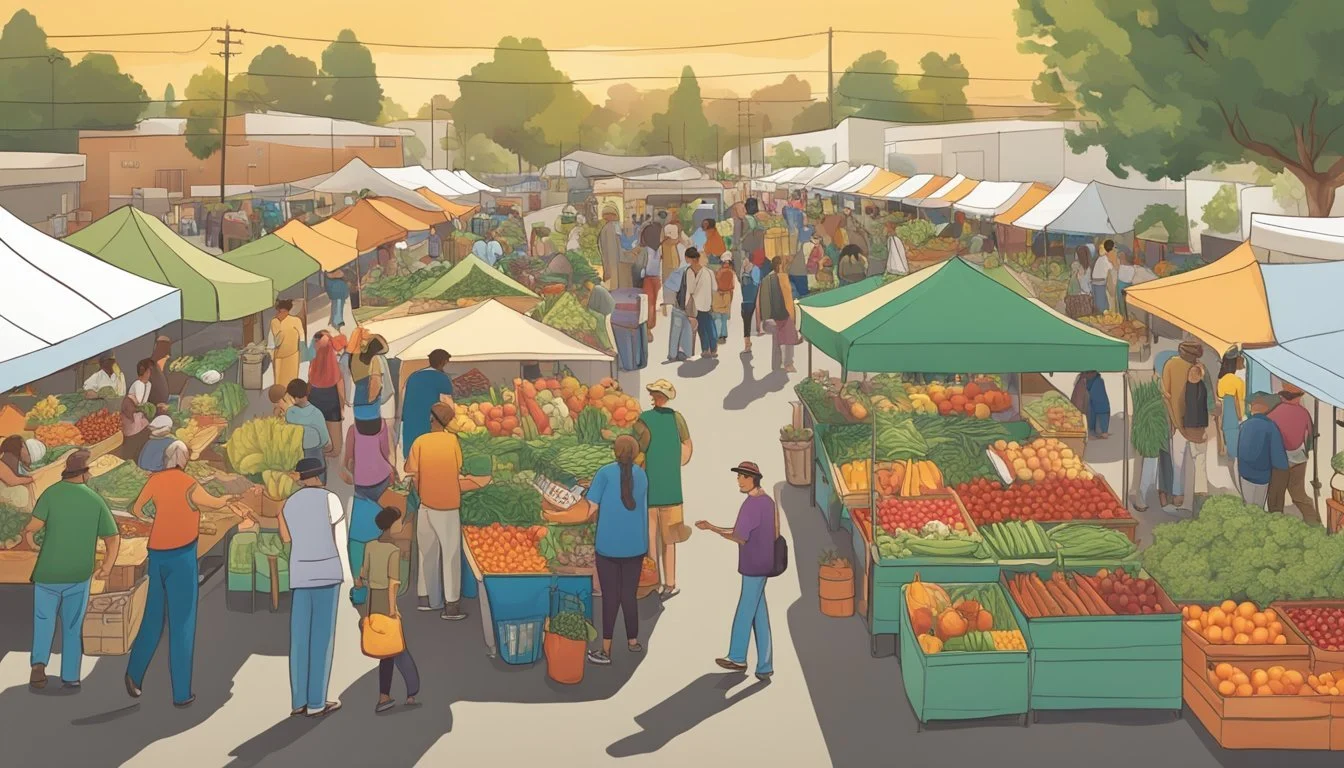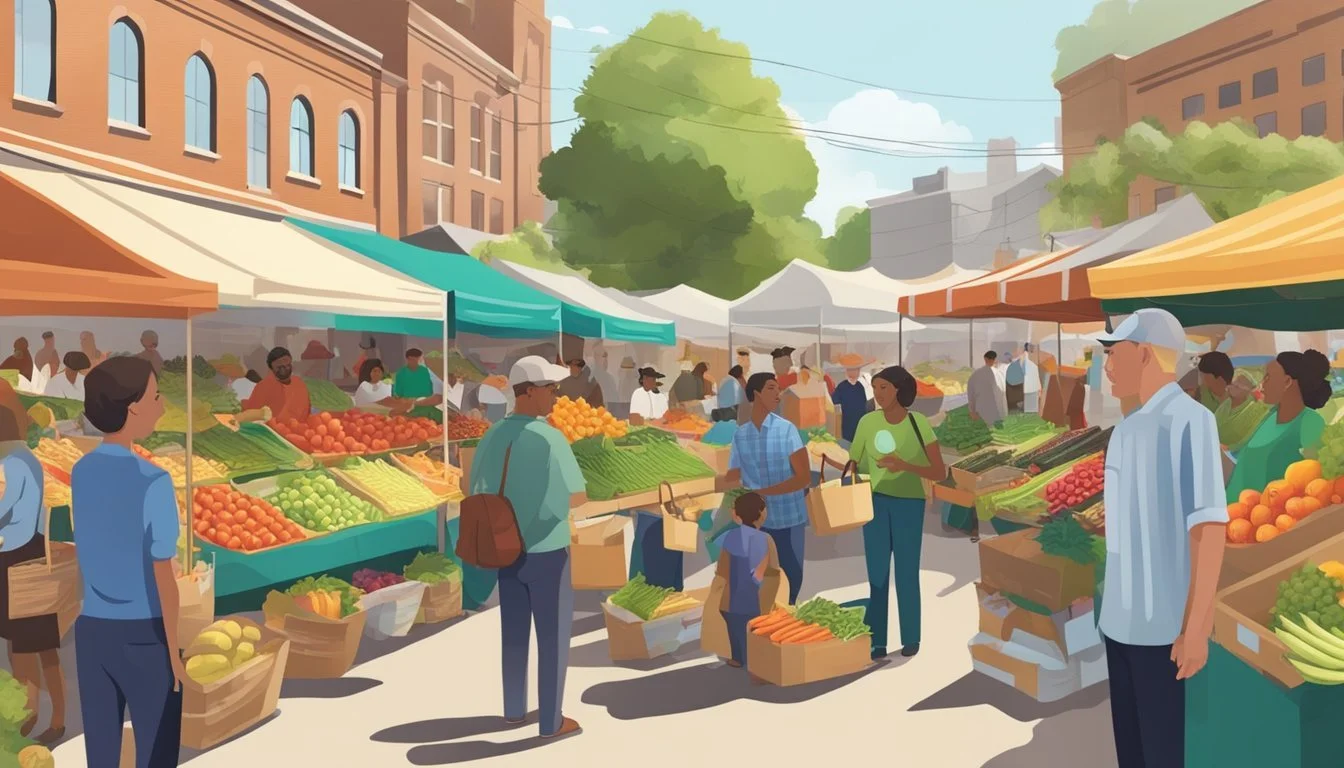Community Supported Agriculture (CSA) in Costa Mesa, CA
A Guide to Local Sustainably-Sourced Produce
Community Supported Agriculture, commonly known as CSA, represents a mutually beneficial partnership between local farmers and community members in areas such as Costa Mesa, California. In this model, consumers purchase subscriptions or shares from their local farms and, in return, receive a portion of the harvest throughout the farming season. This system not only facilitates fresh, seasonal produce for community members but also provides direct support and financial stability for farmers.
In Costa Mesa, CSA programs like the one offered by Tanaka Farms highlight the city's commitment to sustainable agriculture and community engagement. By participating in a CSA, residents not only contribute to the local economy but also become part of a wider movement that prioritizes ecological stewardship and the enjoyment of locally-sourced food. The anticipation of each week's box can also be an educational experience, introducing households to a diverse array of produce and encouraging healthier eating habits.
Notable for their innovation and adaptability, Costa Mesa’s local farms sometimes diversify the traditional CSA offerings by incorporating events and themes, such as pumpkin patches and cultural celebrations. This approach not only enhances the community's connection to the food they eat but also enriches the local culture, intertwining agricultural practice with the unique social fabric of the area.
What Is Community Supported Agriculture (CSA)?
Community Supported Agriculture (CSA) is a model that fosters a partnership between farmers and the community, facilitating access to local, seasonal produce through a subscription-based service.
History and Origins
The concept of CSA began in the 1960s in Germany, Switzerland, and Japan in response to concerns about food safety and the urbanization of agricultural land. It emerged in the United States in the 1980s and has since grown in popularity, with thousands of farms participating nationwide.
CSA Concept and Structure
CSA operates on the principle of members or consumers purchasing a share of a farm's harvest in advance. This model serves a dual purpose:
Financial Security: By paying for produce at the start of the growing season, members give farmers a predictable income and the ability to plan for their crop needs.
Shared Risk and Reward: Both farmers and members share the risks of farming, such as weather challenges, and the bounty of the harvest.
Members receive periodic deliveries of fresh, local, and often seasonal produce, which vary depending on the farm's offerings. The subscription can also cultivate a deeper understanding and appreciation for the farm's agricultural process among the community.
Benefits of Joining a CSA
Joining a Community Supported Agriculture (CSA) program in Costa Mesa, CA gives consumers access to fresh, locally-grown produce while supporting sustainable farming practices and the local economy.
For Consumers
Health and Nutrition: Consumers receive a wealth of fresh vegetables and other produce, often organic, which contributes to a healthier, more nutritious diet.
Local Food: Being part of a CSA means eating seasonally and discovering local food varieties that may not be available in standard grocery stores.
Community Connection: Membership often includes newsletter updates and farm visits, fostering a community around sustainable food practices.
For Farmers
Sustainable Relationships: Farmers establish a relationship with members, leading to a supportive network and direct feedback on their produce.
Financial Security: Receiving payment upfront through memberships helps to stabilize the farm's finances, aiding in planning and preparing for the season.
Local Economy: CSAs can enrich the local economy by keeping food dollars circulating within the area and supporting other local businesses associated with the farm.
CSA Models in Costa Mesa
Costa Mesa offers a range of Community Supported Agriculture (CSA) programs that cater to the preferences of the community. These models include share-based subscriptions, flexible market-style pickups, and convenient CSA subscription boxes tailored to different lifestyles.
Traditional Share-Based CSA
In traditional share-based CSA models, participants purchase a "share" of the harvest upfront. This model facilitates a direct partnership between consumers and the farms. Pickup Locations are typically at the farms themselves or at designated community spots, where shareholders receive a regular delivery of fresh produce during the harvest season.
Delivery Schedule: Consumers can usually choose between weekly or bi-weekly shares, depending on the farm's offerings.
Market-Style CSA
The market-style CSA model allows for more autonomy. Here, members still pay upfront but can choose the specific produce they take home from a more comprehensive selection at designated market locations. This model mimics the farmers' market experience with added benefits exclusive to CSA members.
Home Delivery: Some market-style CSAs in Costa Mesa may include the option for home delivery for an added convenience fee.
CSA Subscription Boxes
CSA subscription boxes merge the CSA model with the convenience of modern meal delivery services. Farms or aggregators curate boxes, small or large, based on seasonal availability and deliver them to the customers' doorstep.
Delivery Schedule: Typically, customers select the frequency of their subscription, such as weekly or bi-weekly, and can often customize the contents of their box.
In Costa Mesa, the CSA farms strive to accommodate varying schedules and food preferences while supporting local agriculture and providing fresh, quality products to their members.
Organic and Sustainable Practices
Costa Mesa's commitment to Community Supported Agriculture (CSA) is rooted in practices that prioritize organic farming and sustainability. These methods not only ensure the production of healthy, local food but also contribute positively to the environment through responsible farming techniques.
Benefits of Organic Farming
Organic farming in Costa Mesa maintains an emphasis on using minimal chemical fertilizers, if any. Instead, farmers often employ natural composts and manure to nurture their crops. Organic farming benefits include:
Enhanced Soil Fertility: By rotating crops and using organic matter, the soil retains its nutrients and fertility season after season.
Environmental Preservation: This approach avoids the use of synthetic pesticides or fertilizers, which can be harmful to wildlife and ecosystems.
These practices are not only healthful for consumers but also foster a sustainable food system.
Local CSA Farming Techniques
CSA farmers in Costa Mesa employ various techniques aligned with sustainable and responsible farming methods that emphasize seasonal and local food production. Techniques include:
Drip Irrigation Systems: These minimize water waste by delivering water directly to plant roots.
Cover Crops: Used in the off-season, they prevent soil erosion and replenish nutrients.
Integrated Pest Management: This method involves controlling pests using the least possible amount of chemicals, favoring biological and cultural management strategies instead.
By focusing on these techniques, farmers ensure a year-round supply of organic and sustainable produce for their community.
Types of Produce and Products Offered
In Costa Mesa, California, Community Supported Agriculture programs offer a variety of fresh produce that caters to the preferences of local consumers. The core offerings center around a diverse selection of vegetables and fruits, which are often picked at peak harvest to ensure maximum freshness and nutritional value.
Vegetables: A typical CSA box might include staples such as lettuce, carrots, celery, kale, and tomatoes. Seasonal rotations ensure that members receive a wide range of produce; for example, green beans in the summer, and beets in the cooler months.
Fruits: Fruit selections often reflect local growing conditions with items like oranges and strawberries. These are especially popular, known for their juicy sweetness and are typically harvested in abundance within the region.
Specialty Items: While the focus is squarely on produce, some CSAs in Costa Mesa offer additional farm products such as eggs from free-range chickens or handcrafted cheese. These items underscore the CSA’s commitment to sustainability and support for local agriculture.
Members may also encounter unique offerings like broccoli, corn, and a variety of lettuce types in their share. These products are usually grown with minimal sprays and fertilizers, emphasizing the stewardship of the land and adherence to food safety standards.
In essence, a CSA in Costa Mesa provides a direct connection between the community and the diverse array of products generated by local farmers. The partnership fosters a thriving food community built on the shared values of health, sustainability, and support for local producers.
Seasonal Availability and Harvesting
Community Supported Agriculture in Costa Mesa, CA, thrives on a detailed understanding of the seasons and meticulous planning regarding crop rotation and harvest timings. Adapting to weather patterns is crucial for optimizing the yield and ensuring the freshness of produce.
Seasonality and Crop Rotation
In Costa Mesa, farmers employ organic farming methods to ensure a sustainable crop yield year-round. Seasonal crops vary, with each quarter bringing different varieties to harvest:
Spring: A rise in leafy greens like spinach and lettuces, along with herbs and peas.
Summer: The peak of tomatoes, peppers, squash, and stone fruits.
Fall: Root vegetables and apples come into season.
Winter: Citrus fruits and hardy leafy greens, such as kale, are prevalent.
Crop rotation not only enriches the soil but also naturally reduces pests, contributing to the success of organic farming practices.
Weather Impacts on Harvesting
Weather is a pivotal factor influencing the availability of fresh produce. Costa Mesa's climate, characterized by mild winters and warm summers, generally supports a wide range of crops. However, unexpected weather events can alter the harvesting schedule. A particularly dry season might hasten the harvest of certain crops, while an unexpected rain could delay picking schedules. Farmers must remain agile, constantly adjusting their harvesting strategies in response to weather conditions to ensure continued delivery of fresh, seasonal produce to CSA members.
CSA Management and Operations
In Costa Mesa, CA, the management and operations of Community Supported Agriculture (CSA) programs are crucial elements that ensure their success. These operations encompass coordinating memberships, handling financial transactions, and fostering community engagement.
Membership Coordination
CSA programs in Costa Mesa prioritize efficient membership coordination, employing software tools like CSAware for smooth operations. Farmers offer various subscription options, such as weekly or bi-weekly box deliveries, which customers can select depending on their needs. Maintaining an up-to-date member database is essential for the flow of nutrient-dense, seasonal produce from farm to table.
Financial Aspects and Payments
Financial transactions within CSAs are handled with transparency and efficiency. Members typically pay for their shares of the harvest in advance, aiding farmers with the capital required for the upcoming season. The cost for a share can range from $400 to $700 annually, with payment plans varying by CSA. Farms like Costa Produce Farm emphasize the importance of Food Safety Certification, coupled with responsible stewardship that includes minimal use of sprays and fertilizers.
Community Involvement and Volunteering
Community involvement is a cornerstone of CSA operations. As a 501(c)(3) non-profit entity, certain CSAs encourage local community members to volunteer, reinforcing the connection between consumers and their food source. Through agriculture-related activities, volunteers gain a deep appreciation of sustainable food practices and the role they play in supporting local farmers.
Locating and Choosing a CSA in Costa Mesa
When exploring Community Supported Agriculture in Costa Mesa, individuals have various resources and strategies at their disposal to identify and select a CSA that best fits their needs.
Research and Directories
Prospective CSA members should start by consulting LocalHarvest or the CSA Innovation Network, as these platforms provide comprehensive directories for locating CSAs. LocalHarvest is a valuable resource with a user-friendly interface and a searchable database. Here's how to use it:
Navigate to the LocalHarvest website.
Enter "Costa Mesa, CA" in the search bar.
Filter results by choosing the CSA category.
Another option is the CSA Innovation Network, which offers resources and a directory aimed at connecting consumers with local CSAs. It functions as an informational hub for both farmers and consumers.
Recommendations and Reviews
Tanaka Farms is a prominent player in the CSA market and reflects the high standards expected from such providers in Costa Mesa. Potential subscribers should:
Read online reviews about the CSA's produce quality and customer service.
Ask for first-hand accounts from current or past members to gauge satisfaction.
In conclusion, when selecting a CSA in Costa Mesa, check reliable directories like LocalHarvest or the CSA Innovation Network, and scrutinize reviews and recommendations, paying special attention to well-regarded options such as Tanaka Farms.
Challenges and Considerations
Community Supported Agriculture (CSA) in Costa Mesa faces unique hurdles, which are critical for both producers and consumers to navigate. The operation and sustainability of CSA depend largely on how these challenges are addressed.
Mitigating Potential Risks
CSA models inherently involve shared risks between producers and consumers, especially in terms of crop yields. Local research indicates that adverse weather conditions and pests can lead to lower harvests, which affects both the farmers' income and the shareholders' returns. Mitigation strategies include:
Diversified planting: A variety of crops can safeguard against total loss due to a disease affecting a single species.
Clear communication: Farmers must educate shareholders about the inherent risks and set realistic expectations early on.
Ensuring Year-Round Operation
The CSA model typically thrives during the main growing seasons but can struggle during off-peak times. Surveys from CSA farms in similar locales suggest:
Seasonal variety: Introducing greenhouse crops or preserved foods during the winter can maintain a continuous supply.
Community engagement: Off-season workshops or farm events help keep shareholders connected and invested in the CSA.
This approach promotes a robust local community, integral to sustainability, and ensures that the CSA remains functional and valuable all year.
Community Impact and Future Outlook
The section below explores the tangible benefits that Community Supported Agriculture (CSA) has contributed to the local community of Costa Mesa, CA. It also delves into the emerging trends and innovations that are shaping the future of CSAs in the area.
Supporting the Local Community
Community Supported Agriculture in Costa Mesa plays a significant role in bolstering the local economy. It enables consumers to buy fresh produce directly from farmers, ensuring that more dollars circulate within the community. This direct sales model not only benefits the farmers by providing them with upfront capital but also strengthens the bond between the community and its food sources. Frequenting farmers markets has become a cherished weekend activity for many residents, who take pride in supporting local agriculture and contributing to the California tradition of farm-to-table dining.
Sustainability efforts are augmented through CSA participation, contributing positively to the environment by reducing the carbon footprint associated with long-distance food transport. Furthermore, CSA customers often receive an education in seasonal eating, as they become aware of and adapt to the growing cycles of their region.
CSA Trends and Innovations
Costa Mesa's CSAs are not immune to the currents of change; they are part of a broader CSA Innovation Network. New models and methodologies are continually being integrated to enhance the viability and impact of these agricultural initiatives. For instance, some CSAs are integrating technology to offer online ordering platforms, thus expanding their reach and accessibility. Others are experimenting with new crop varieties and farming techniques to increase sustainability and resilience against climate challenges.
Local CSAs often engage in collaborations with culinary specialists and health experts to offer recipe suggestions and cooking classes, fostering a more profound community appreciation for locally sourced food and healthy living. Embracing these innovations, Costa Mesa's CSA programs are seeking to ensure their growth and maintain relevance in a rapidly evolving food marketplace.
Additional CSA Resources and Education
Community Supported Agriculture (CSA) enthusiasts in Costa Mesa, CA, have the opportunity to deepen their knowledge and skills through a variety of educational resources and community engagements. These range from hands-on workshops to vibrant online communities.
Workshops and Cooking Classes
Workshops provide an interactive way to learn about sustainable farming practices and how they contribute to nutrition and the environment. Costa Mesa's local farms and organizations often offer classes focusing on how to utilize fresh produce effectively.
Cooking classes specifically tailored to seasonal CSA produce can guide members on transforming their weekly shares into nutritious and appetizing meals. These classes are designed to bolster cooking skills, enhance understanding around the importance of fresh food, and encourage a more adventurous approach in the kitchen.
Nutrition workshops may also be available. They focus on the health benefits of the farm-to-table approach espoused by CSAs, helping individuals make informed dietary choices.
Online Forums and Communities
The online space provides digital avenues for grassroots movements and CSA communities:
Digital forums offer a platform for exchanging ideas, seeking advice, and sharing experiences pertaining to CSA culture. They can be a strong support network for both seasoned and novice CSA participants.
Social media communities and blogs regularly discuss various aspects of CSA, such as tips for storage and nutritional facts about the produce. These communities are frequently updated with print and digital resources, upcoming events, and educational content on how to maximize one's CSA experience.
By participating in these workshops, classes, and online forums, members of the CSA in Costa Mesa can enrich their understanding and enjoyment of their CSA shares, while contributing to a stronger, more informed community.
Exploring CSA Partnerships and Collaborations
Community Supported Agriculture in Costa Mesa has fostered a robust network of partnerships and collaborations that reinforce the city's commitment to local food systems and community empowerment. These relationships amplify the impact of CSAs, ensuring that members receive fresh produce while supporting sustainable agricultural practices.
B2B Partnerships
Business-to-business (B2B) partnerships within Costa Mesa's CSAs prove vital for scaling operations and enhancing product offerings. Local restaurants often form alliances with CSA farms, vowing to source a percentage of their menu from the harvest. This not only secures consistent revenues for farmers but also allows restaurants to advertise farm-fresh ingredients, appealing to health-conscious consumers. Meanwhile, food retailers collaborate by providing delivery options for CSA shares, thus improving the convenience for members and extending the reach of CSA products.
Responsibility: Each partner takes on roles that support local farmers, with restaurants committing to seasonal menus aligned with the CSA's harvest cycle.
Delivery Options: These partnerships expand the availability of CSA shares through innovative solutions like in-store pickups or incorporating CSA deliveries within existing distribution networks.
Community and Education Sector Collaborations
Engagement with the community and education sector is a keystone for CSAs in Costa Mesa. Schools provide fertile ground for educational programs on sustainability and nutrition, sponsored by CSA farms. These initiatives build a connection with the younger generation, planting the seeds for lifelong support of local agriculture.
Community Events: CSAs often participate in community events to showcase their produce and educate residents about the benefits of supporting local food systems.
SNAP Access: Integration with programs like the Supplemental Nutrition Assistance Program (SNAP) broadens the CSA's reach, facilitating access to fresh, local food for a wider demographic and solidifying their role within the community.
By establishing these multifaceted partnerships and collaborations, CSAs in Costa Mesa are reinforcing their mission, expanding their influence, and fostering a more resilient local food system.
How to Get Involved with CSA in Costa Mesa
Individuals in Costa Mesa seeking fresh, local produce can become part of a Community Supported Agriculture (CSA) system. CSAs foster a symbiotic relationship between farmers and customers where both parties benefit. Members subscribe and pre-pay for a share of the upcoming harvest, directly supporting farmers.
To join a CSA in Costa Rica:
Research Local Farms
Identify farms offering CSA subscriptions within or near Costa Mesa.
Consider the variety, size, and type of produce offered.
Choose a Subscription
Box Size: Farms typically provide small or large boxes.
Frequency: Opt for weekly or bi-weekly deliveries.
Sign Up
Complete the farm's subscription agreement to become a member.
Understand the terms, such as pick-up locations and payment plans.
Pick-up or Delivery
Determine if the farm offers on-site pick-up or delivery services.
Plan accordingly to receive your produce.
Engage
Members can often volunteer at the farm.
Attend farm events to deepen the community relationship.
Action Detail Find a CSA Farm Explore local options and farm offerings. Select Box Size Decide on the quantity of produce needed. Determine Frequency Choose between weekly or bi-weekly deliveries. Sign Up & Payment Join the CSA, review payment details and schedule. Pick-Up/Delivery Opt for convenience based on your location.
Members play a crucial role in sustaining local agriculture, ensuring that farmers in Costa Mesa can continue to provide the community with fresh, seasonal food.


